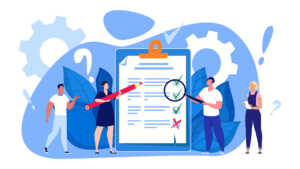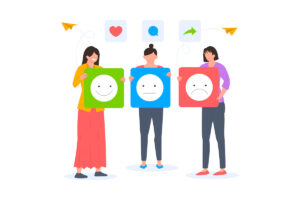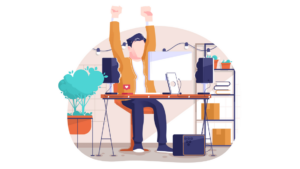DISTRACTIONS, everywhere! Hey, it’s taken me 124 years just to write these 4 sentences.
It doesn’t help that we’ve built a world that’s so entwined with digital architecture, the internet, and social media. We’ve basically built a distraction chamber for attention. Tasks we’d happily carry out pre-smartphones uninterrupted are intercepted by a whole range of competing notifications, all dropping that dopamine buzz.
And you don’t even need to be receiving notifications to be distracted – any thought that pops into your mind can be accommodated, ‘hmm, what happened to the cast of Saved by the Bell?’, well, why not search and find out.
This makes it increasingly difficult to fully focus on work tasks or recreation. Udemy’s work survey found that 70% of employees feel distracted on the job and this can end up costing the economy billions…damn cat videos.
Dedicating your entire focus to whatever is happening in the present is getting tougher but it can deliver better, more wholesome results.
Don’t Be a Half Listener
The art of listening is one of the best skills you can practice in your personal and professional life. To some of you, this is easy, you probably do it already and it’s weird to think others don’t, right? But trust me, when you start to look around and notice who listens and who doesn’t, you’ll see some repeat offenders.
Listening isn’t about taking in what someone else is saying and jumping in with your own thoughts or anecdotes related to yourself asap – it’s about absorbing information, asking thoughtful questions and fostering a discussion.
Conversations are compromises and need to give and take from participants.
Being a half-listener amounts to taking in what others are saying and swirling your own idea around in your head until you’ve found a time to say it, in the meantime, have you really been listening? You’re creating distractions.
[bctt tweet=”Conversations are compromises and need to give and take from participants.” username=”@bryankramer”]
Whatever you do, don’t get your phone out while someone’s chatting to you either, it looks gross.
And retaining info that someone’s spoken to you about can go a really long way in building trust and relationships with people. Remembering recommendations, stories and offering advice on subjects they’ve spoken about can make people feel valued.
Positively listening and giving someone your full attention can be one of the most affirming ways of treating a person and you’re developing a social contract that says ‘hey, I value and appreciate what you say’. Stay alert, be engaged and listen!
Focus: There Can Be Only One!
You’ve probably got a gigantic to-do list at any one time and every task feels just as important as the other. But prioritizing your to-do list will go a long way in making you feel more organized and on top of everything.
It’s up to you how you approach tasks – do you start with the hardest and most daunting, or get some easier wins out the way?
One thing’s for sure, focusing on one task at a time can help you to divert all of your attention, without dividing your thoughts and brain-power to a range of other things simultaneously.
I think with all the new-fangled software, email overload and dashboards everyone has going on, there’s a danger of knowing everything you need to do all at once. When we goal shift from one thing to another, it costs us time and effort.
In fact, it could be around 40% of your productive time, which is a significant amount of time to use constantly juggling and reprioritizing, which is easy to do through digital multitasking.
Try to limit yourself from straying into other tasks while you’re concentrating on one – you’ll carry it out with more effectiveness and 40% more time sounds pretty sweet!
[bctt tweet=”Udemy’s work survey found that 70% of employees feel distracted on the job and this can end up costing the economy billions” username=”@bryankramer”]
And this means forging ahead with the tasks you said to yourself that you’ll carry out first. Stop arguing with yourself internally, moving the goalposts because you’re finding excuses and stick to your tasks.
Don’t carry tasks out in a half-assed way either. Breaking promises with yourself is bad practice and your ‘past you’ would be giving you a major disappointed look.
Declutter. Nuff Said.
Right, not to get all Marie Kondo on you, because I know you’ve probably heard a million and one things about her new Netflix series BUT, decluttering and clearing your physical space really can spark some joy.
Having a whole load of devices, interesting books, games or whatever else on your desk or the physical space where you want to get things done will end up distracting you.
Maybe you’re putting things there because deep down, you actually want to be distracted. Well, don’t do it – clear your spaces and you’ll clear your mind of distractions too.
Make Attention Time for YOU
We need to re-learn and practice how to make time for ourselves that’s tranquil, relaxing and truly distraction-free. If you do this in your personal down-time, you’ll feel more equipped and emotionally resilient to carry out professional tasks more effectively too.
Take reading, for example, a good book allows you to escape and immerse yourself in new worlds, you’re not supposed to get hauled out of a mythical kingdom by an Instagram message.
In a Nature Communications study, neuroscientists found that distractions interrupt our cognition and pretty much clears out a proportion of short term thinking.
Getting a message or looking at our phone means our subthalamic nucleus engages and it’s the brain equivalent of “a broad stop is the sort of whole-body jolt we experience when, for example, we’re just about to exit an elevator and suddenly see that there’s another person standing right there on the other side of the doors.”
That’s not good!
Give yourself distraction-free time. Limit your electronics, close your door, don’t multi-task and remove other internal distractions too. Enjoy!
Final Thought
Stop reading this article and do what you’re supposed to!






